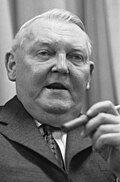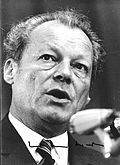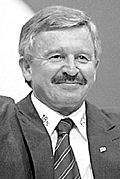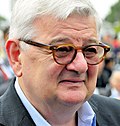The German Chancellorship
An in-depth exploration of Germany's head of government, from historical roots to modern 'chancellor democracy'.
Explore Role 👇 View History 📜Dive in with Flashcard Learning!
🎮 Play the Wiki2Web Clarity Challenge Game🎮
Overview
Head of Government
The Chancellor of Germany, officially the Federal Chancellor of the Federal Republic of Germany, serves as the head of the federal government. This pivotal role makes the Chancellor the chief executive of the Federal Cabinet, leading the executive branch of the German political system. The office is often considered the most powerful within Germany, reflecting the country's "chancellor democracy" structure.
Election and Appointment
The Chancellor is elected by the Bundestag, Germany's federal parliament, following a proposal from the federal president. This election occurs without prior debate, as stipulated by Article 63 of the German Constitution (Basic Law). In times of national defense, declared by the Bundestag, the Chancellor also assumes the critical position of commander-in-chief of the Bundeswehr, Germany's armed forces.
Incumbency and Legacy
Since 1949, ten individuals—nine men and one woman—have held the office of Chancellor of the Federal Republic of Germany. The inaugural Chancellor was Konrad Adenauer, who served from 1949 to 1963. The current officeholder, as of May 6, 2025, is Friedrich Merz of the Christian Democratic Union. Over the various German states and empires since 1867, a total of 33 individuals have served as heads of government, predominantly under the title of Chancellor.
Historical Evolution
Imperial Roots (Pre-1867)
The concept of a "chancellor" in German governance traces its origins back to the Holy Roman Empire (circa 900–1806). Initially, the title of cancellarius was bestowed upon the head of the clerics within the Imperial chapel, who managed the emperor's chancery, responsible for issuing official documents. Over time, the office of imperial archchancellor became associated with the Archbishops of Mainz. Later, agencies like the imperial chancellery (1559) and the Austrian state chancellor (1753) emerged, managing internal and foreign affairs for the Habsburg monarchy. Following the Holy Roman Empire's dissolution in 1806, figures like Prince Klemens von Metternich and Karl August von Hardenberg served as state chancellors for the Austrian Empire and the Kingdom of Prussia, respectively. The subsequent German Confederation, established after the Napoleonic Wars, lacked a central government or legislature.
North German Confederation & Empire (1867–1918)
The modern chancellorship began with the North German Confederation in 1867, following Prussia's victory in the Austro-Prussian War. Otto von Bismarck, then Minister-President of Prussia, became the first Bundeskanzler (Federal Chancellor). In 1871, with the formation of the German Empire, the title evolved to Reichskanzler (Imperial Chancellor). During this era, the Chancellor was the sole responsible minister at the federal level, appointed by the King of Prussia (later the German Emperor). Bismarck strategically held both the Prussian Minister-President and Federal Chancellor roles, leveraging Prussia's dominant position and votes in the Bundesrat to effectively govern. This system, where the Chancellor's power was largely independent of parliamentary confidence, persisted until constitutional reforms in October 1918, which mandated parliamentary confidence for the Chancellor.
Weimar Republic (1919–1933)
Following World War I and the revolutionary period of 1918-1919, the Weimar Republic continued the office of Reichskanzler. Under the Weimar Constitution, the Chancellor headed a collegial democratic government, appointed by the Reich President, with ministers appointed on the Chancellor's recommendation. Critically, the government required the confidence of the Reichstag. While the Chancellor had the prerogative to set policy guidelines, this power was often constrained by the necessity of coalition governments and the significant powers of the Reich President. Cabinet decisions were made by majority vote, meaning the Chancellor could be outvoted. This era saw chancellors often acting more as mediators than strong political initiators.
Nazi Germany (1933–1945)
Adolf Hitler's appointment as Chancellor on January 30, 1933, marked a radical transformation of the office. Within months, the Enabling Act granted the Chancellor full legislative powers, effectively sidelining the Reichstag and the Weimar Constitution. After President Paul von Hindenburg's death in 1934, Hitler merged the offices of Reich Chancellor and Reich President, assuming the title of Führer und Reichskanzler, consolidating absolute power. This effectively abolished the presidency and removed any constitutional checks on the Chancellor's authority. In April 1945, Hitler's final instructions aimed to separate the offices again, leading to Joseph Goebbels briefly succeeding him as Chancellor, followed by Grand Admiral Karl Dönitz appointing Count Schwerin von Krosigk as "Leading Minister" after Goebbels' suicide.
Modern Chancellorship (1949–Present)
Chancellor Democracy
The 1949 Basic Law of the Federal Republic of Germany significantly empowered the Bundeskanzler, granting broad authority to initiate government policy and diminishing the federal president's role. This constitutional framework has led to Germany being characterized as a "chancellor democracy," highlighting the Chancellor's central position as the country's chief executive. Despite this, the Chancellor holds the third-highest office in the German order of precedence, after the President of Germany and the President of the Bundestag.
Party Leadership and Influence
The Chancellor's authority is derived not only from the Basic Law but also from their leadership of the party or coalition holding a majority in the Bundestag. Historically, most Chancellors, with the exceptions of Helmut Schmidt and Olaf Scholz, have also served as chairmen of their respective parties. Konrad Adenauer, the first Chancellor, established many enduring precedents, centralizing major decisions and often treating ministers as extensions of his authority. While subsequent Chancellors have adopted less domineering styles, the office retains substantial ex officio authority.
Cabinet Composition and Principles
The Chancellor determines the composition of the Federal Cabinet, recommending ministers for formal appointment by the President. No parliamentary approval is required for these appointments. The Chancellor also dictates the number of cabinet ministers and their specific duties. The functioning of the executive branch is guided by three core principles outlined in Article 65 of the Basic Law:
- Chancellor Principle (Richtlinienkompetenz): The Chancellor is responsible for all government policies and issues legally binding directives that cabinet ministers must implement.
- Ministerial Autonomy: Each minister has the freedom to manage their department and propose legislation, provided their policies align with the Chancellor's broader guidelines.
- Cabinet Principle: Disagreements between federal ministers on jurisdictional or budgetary matters are resolved by the cabinet through majority vote.
Federal Chancellors (1949–Present)
A chronological overview of the Federal Chancellors of the Federal Republic of Germany.
| Portrait | Name (Birth–Death) |
Term of office | Political party |
Vice Chancellor(s) | Cabinets | ||||
|---|---|---|---|---|---|---|---|---|---|
| Term | Time in office | ||||||||
| 1 |  |
Konrad Adenauer (1876–1967) |
15 September 1949 – 16 October 1963 |
14 years, 31 days | CDU | Franz Blücher (1949–57) Ludwig Erhard (1957–63) |
I II III IV |
||
| 2 |  |
Ludwig Erhard (1897–1977) |
16 October 1963 – 1 December 1966 |
3 years, 46 days | CDU | Erich Mende (1963–66) Hans-Chr. Seebohm (1966) |
I II |
||
| 3 |  |
Kurt Georg Kiesinger (1904–1988) |
1 December 1966 – 22 October 1969 |
2 years, 325 days | CDU | Willy Brandt (1966–69) | I | ||
| 4 |  |
Willy Brandt (1913–1992) |
22 October 1969 – 7 May 1974 |
4 years, 197 days | SPD | Walter Scheel (1969–74) | I II |
||
| Vice Chancellor Walter Scheel served as acting Chancellor from 7 May to 16 May 1974. | |||||||||
| 5 |  |
Helmut Schmidt (1918–2015) |
16 May 1974 – 1 October 1982 |
8 years, 138 days | SPD | Hans-D. Genscher (1974–82) Egon Franke (1982) |
I II III |
||
| 6 |  |
Helmut Kohl (1930–2017) |
1 October 1982 – 27 October 1998 |
16 years, 26 days | CDU | Hans-D. Genscher (1982–92) Jürgen Möllemann (1992–93) Klaus Kinkel (1993–98) |
I II III IV V |
||
| 7 |  |
Gerhard Schröder (b. 1944) |
27 October 1998 – 22 November 2005 |
7 years, 26 days | SPD | Joschka Fischer (1998–2005) | I II |
||
| 8 |  |
Angela Merkel (b. 1954) |
22 November 2005 – 8 December 2021 |
16 years, 16 days | CDU | Franz Müntefering (2005–07) Frank-W. Steinmeier (2007–09) Guido Westerwelle (2009–11) Philipp Rösler (2011–13) Sigmar Gabriel (2013–18) Olaf Scholz (2018–21) |
I II III IV |
||
| 9 |  |
Olaf Scholz (b. 1958) |
8 December 2021 – 6 May 2025 |
3 years, 149 days | SPD | Robert Habeck (2021–25) | I | ||
| 10 |  |
Friedrich Merz (b. 1955) |
6 May 2025 – Incumbent |
149 days | CDU | Lars Klingbeil (Incumbent) | I | ||
Election Process
Constitutional Mandate
The Chancellor is elected by the Bundestag and formally appointed by the President of Germany. This process can occur through a regular election, such as when a newly elected Bundestag convenes or if the office becomes vacant due to death or resignation, or via a constructive vote of no confidence. A critical requirement for election is the "chancellor majority" (Kanzlermehrheit), which mandates a majority of all elected members of the Bundestag, not merely a majority of those present. All Chancellor elections are conducted via secret ballot.
Three-Phase Voting
Article 63 of the Basic Law outlines a structured, multi-phase election process for the Chancellor, designed to ensure a stable government. This process can extend over up to three distinct voting phases:
Confidence Mechanisms
Constructive Vote of No Confidence
A distinctive feature of the German political system is the "constructive vote of no confidence." This mechanism allows the Bundestag to remove a sitting Chancellor only if it simultaneously elects a new Chancellor by a "chancellor majority" (a majority of all members). This design aims to prevent political instability by ensuring that a government vacuum is not created. This motion has been tabled twice in the history of the Federal Republic of Germany, with one successful outcome: Helmut Kohl against Helmut Schmidt in 1982, and one failure: Rainer Barzel against Willy Brandt in 1972.
Motion of Confidence
Conversely, the Chancellor can initiate a "motion of confidence," asking the Bundestag to explicitly express its trust in them. If the Chancellor loses this vote, they do not automatically leave office. Instead, this outcome grants the Chancellor additional strategic options: they can request the President to dissolve the Bundestag and call for a snap election, or they can declare a legislative emergency, allowing the government to bypass the Bundestag in the legislative process for a limited period. This mechanism serves as a tool for the Chancellor to discipline their parliamentary support or, as has occurred in four instances (1972, 1982, 2005, 2024), to deliberately trigger new elections by intentionally losing the vote.
Constructive Votes of No Confidence in the Bundestag
| Date | Proposed Candidate (Party) | Incumbent Chancellor (Party) | Yes-votes | No-votes | Abstentions | Absent / void | Necessary majority | Result |
|---|---|---|---|---|---|---|---|---|
| 27 April 1972 | Rainer Barzel (CDU) | Willy Brandt (SPD) | 247 | 10 | 3 | 236 | 249 | Motion failed |
| 1 October 1982 | Helmut Kohl (CDU) | Helmut Schmidt (SPD) | 256 | 235 | 4 | 2 | 249 | Motion successful |
The Vice Chancellor
Role and Succession
The Chancellor is constitutionally mandated to appoint one of the cabinet ministers as Vice Chancellor (Article 69.1 Basic Law). The primary function of the Vice Chancellor is to deputize for the Chancellor in their absence or if they are unable to perform their duties. While the Chancellor theoretically has full discretion in this appointment, in the context of coalition governments, the leader of the second-largest coalition party typically nominates one of their ministers for this position, which the Chancellor then formally appoints.
Acting Chancellor
In the event that the Chancellor's term ends or they resign, the Bundestag must elect a new Chancellor. The President of Germany may request the outgoing Chancellor to remain in an acting capacity until a successor is elected. However, if the former Chancellor is unwilling or unable to do so, the President has the authority to appoint the Vice Chancellor as acting Chancellor. This occurred once in German history: following Chancellor Willy Brandt's resignation in 1974 due to the Guillaume espionage affair, Vice Chancellor Walter Scheel was appointed acting Chancellor and served for nine days until Helmut Schmidt's election. Notably, Ludwig Erhard, Willy Brandt, and Olaf Scholz are the three individuals who have held both the office of Vice Chancellor and Chancellor.
Vice Chancellors of the Federal Republic of Germany (1949–Present)
| Portrait | Name (Birth–Death) |
Term of office | Political party | Cabinet | Portfolio | ||||
|---|---|---|---|---|---|---|---|---|---|
| Term | Time in office | ||||||||
| 1 |  |
Franz Blücher (1896–1959) |
20 September 1949 – 29 October 1957 |
8 years, 30 days | FDP | Adenauer I Adenauer II |
Marshall Plan/Economic Cooperation | ||
| 2 |  |
Ludwig Erhard (1897–1977) |
29 October 1957 – 16 October 1963 |
5 years, 362 days | CDU | Adenauer III Adenauer IV |
Economic Affairs | ||
| 3 |  |
Erich Mende (1916–1998) |
17 October 1963 – 28 October 1966 |
3 years, 10 days | FDP | Erhard I Erhard II |
Intra-German Relations | ||
| The office was vacant from 28 October to 8 November 1966. | |||||||||
| 4 |  |
Hans-Christoph Seebohm (1903–1967) |
8 November 1966 – 1 December 1966 |
23 days | CDU | Erhard II | Transport | ||
| 5 |  |
Willy Brandt (1913–1992) |
1 December 1966 – 22 October 1969 |
2 years, 325 days | SPD | Kiesinger | Foreign Affairs | ||
| 6 |  |
Walter Scheel (1919–2016) |
22 October 1969 – 16 May 1974 |
4 years, 207 days | FDP | Brandt I Brandt II |
Foreign Affairs | ||
| 7 |  |
Hans-Dietrich Genscher (1927–2016) 1st term |
17 May 1974 – 17 September 1982 |
8 years, 123 days | FDP | Schmidt I Schmidt II Schmidt III |
Foreign Affairs | ||
| 8 |  |
Egon Franke (1913–1995) |
17 September 1982 – 1 October 1982 |
14 days | SPD | Schmidt III | Intra-German Relations | ||
| The office was vacant from 1 October to 4 October 1982. | |||||||||
| 9 |  |
Hans-Dietrich Genscher (1927–2016) 2nd term |
4 October 1982 – 18 May 1992 |
9 years, 230 days | FDP | Kohl I Kohl II Kohl III Kohl IV |
Foreign Affairs | ||
| 10 |  |
Jürgen Möllemann (1945–2003) |
18 May 1992 – 21 January 1993 |
249 days | FDP | Kohl IV | Economic Affairs | ||
| 11 |  |
Klaus Kinkel (1936–2019) |
21 January 1993 – 27 October 1998 |
5 years, 279 days | FDP | Kohl IV Kohl V |
Foreign Affairs | ||
| 12 |  |
Joschka Fischer (b. 1948) |
27 October 1998 – 22 November 2005 |
7 years, 26 days | Alliance 90/The Greens | Schröder I Schröder II |
Foreign Affairs | ||
| 13 |  |
Franz Müntefering (b. 1940) |
22 November 2005 – 21 November 2007 |
1 year, 364 days | SPD | Merkel I | Labour and Social Affairs | ||
| 14 |  |
Frank-Walter Steinmeier (b. 1956) |
21 November 2007 – 27 October 2009 |
1 year, 340 days | SPD | Merkel I | Foreign Affairs | ||
| 15 |  |
Guido Westerwelle (1961–2016) |
27 October 2009 – 16 May 2011 |
1 year, 201 days | FDP | Merkel II | Foreign Affairs | ||
| 16 |  |
Philipp Rösler (b. 1973) |
16 May 2011 – 17 December 2013 |
2 years, 215 days | FDP | Merkel II | Economic Affairs | ||
| 17 |  |
Sigmar Gabriel (b. 1959) |
17 December 2013 – 14 March 2018 |
4 years, 87 days | SPD | Merkel III | Economic Affairs (2013–2017) Foreign Affairs (2017–2018) |
||
| 18 |  |
Olaf Scholz (b. 1958) |
14 March 2018 – 8 December 2021 |
3 years, 269 days | SPD | Merkel IV | Finance | ||
| 19 |  |
Robert Habeck (b. 1969) |
8 December 2021 – 6 May 2025 |
3 years, 149 days | Alliance 90/The Greens | Scholz | Economic Affairs and Climate Protection | ||
| 20 |  |
Lars Klingbeil (b. 1978) |
6 May 2025 – Incumbent |
149 days | SPD | Merz | Finance | ||
Official Residence
Federal Chancellery, Berlin
Since 2001, the primary official seat of the Chancellor of Germany has been the Federal Chancellery (Bundeskanzleramt) in Berlin. This modern architectural landmark serves as both the Chancellor's office and a symbol of governmental power in the capital. Its design reflects transparency and efficiency, embodying the contemporary German political landscape.
Palais Schaumburg, Bonn
The historic Palais Schaumburg in Bonn, the former capital of West Germany, now functions as a secondary official seat for the Chancellor. This elegant building holds significant historical importance, having served as the main Federal Chancellery for decades after World War II. It represents a tangible link to the early years of the Federal Republic and its foundational leaders.
Schloss Meseberg, Country Retreat
For official retreats and cabinet meetings requiring a more secluded and reflective environment, the Chancellor utilizes Schloss Meseberg, located in the state of Brandenburg. This baroque palace provides a distinguished setting for high-level discussions and diplomatic engagements away from the bustling capital, offering a blend of historical grandeur and modern functionality.
Salary and Address
Remuneration
As the holder of the third-highest state office in Germany, the Chancellor receives a substantial annual remuneration. As of 2020, the Chancellor's salary amounts to €220,000 per annum, supplemented by an additional €22,000 bonus. This compensation structure is determined by specific federal laws, including the Federal Law on Ministers (Bundesministergesetz) and the Federal Law on Salaries of Officers (Bundesbesoldungsgesetz), reflecting the significant responsibilities and demands of the office.
Formal Address
The appropriate style of address for the Chancellor in German is Herr Bundeskanzler for a male Chancellor and Frau Bundeskanzlerin for a female Chancellor. In formal international correspondence and diplomatic contexts, the Chancellor is accorded the distinguished title of "His/Her Excellency the Chancellor of the Federal Republic of Germany" (Seine/Ihre Exzellenz der Bundeskanzler/die Bundeskanzlerin der Bundesrepublik Deutschland), signifying their esteemed position on the global stage.
Teacher's Corner
Edit and Print this course in the Wiki2Web Teacher Studio

Click here to open the "Chancellor Of Germany" Wiki2Web Studio curriculum kit
Use the free Wiki2web Studio to generate printable flashcards, worksheets, exams, and export your materials as a web page or an interactive game.
True or False?
Test Your Knowledge!
Gamer's Corner
Are you ready for the Wiki2Web Clarity Challenge?

Unlock the mystery image and prove your knowledge by earning trophies. This simple game is addictively fun and is a great way to learn!
Play now
References
References
- Michael Kotulla: Deutsche Verfassungsgeschichte. Vom Alten Reich bis Weimar (1495â1934). Springer, Berlin 2008, p. 544.
- . WILLY BRANDT QUITS POST IN WAKE OF SPY SCANDAL; ASKS SCHEEL TO TAKE OVER
Feedback & Support
To report an issue with this page, or to find out ways to support the mission, please click here.
Disclaimer
Important Notice
This page was generated by an Artificial Intelligence and is intended for informational and educational purposes only. The content is based on a snapshot of publicly available data from Wikipedia and may not be entirely accurate, complete, or up-to-date.
This is not official governmental or legal advice. The information provided on this website is not a substitute for consulting official German government publications, legal experts, or political scientists for specific inquiries regarding the German chancellorship or political system. Always refer to authoritative sources and consult with qualified professionals for precise and current information. Never disregard official information because of something you have read on this website.
The creators of this page are not responsible for any errors or omissions, or for any actions taken based on the information provided herein.